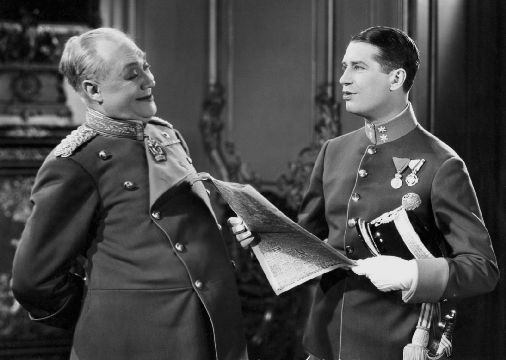The Smiling Lieutenant (1931) 

Director: Ernst Lubitsch
Cast: Maurice Chevalier, Claudette Colbert, Miriam Hopkins
Synopsis: A simple wink, intended by Austrian palace guard Lt. Nikolaus von Preyn for girlfriend, Franzi, is accidentally intercepted — and misread — by the visiting Princess Anna.
I suppose effervescent is the best adjective to describe this early Ernst Lubitsch sound movie. It’s certainly a product of its time, of interest only to film historians and buffs. It was long believed lost until a print re-surfaced in Denmark in the 1990s. We’re to be thankful whenever any work of art that is previously believed to be lost is suddenly recovered, but The Smiling Lieutenant’s rediscovery hasn’t changed the world in any measurable way. It confirms the beginnings of ‘the Lubitsch Touch’ but is a work of such insubstantial frothiness that were it not one of Lubitsch’s it’s discovery would not have created much of a stir.
A young Maurice Chevalier plays Niki, an officer in the Austrian army. Niki’s a bit of a ladies man, and something of a rogue. The film’s opening scene shows a tailor wearily climbing the stairs to Niki’s apartment with an enormous bill in his hand. We get the impression that he’s been that way before, and his visit this time is as unsuccessful as his previous visits. Descending the stairs, he passes a frothy blonde who has clearly been primed with a secret knock which she now uses to gain immediate entry to the apartment.
This is pre-Code Hollywood, and the tone is one of sexual gratification. Niki is still in his bed when the blonde leaves under cover of darkness with a dreamy smile on her face. We’re left in no doubt as to what they’ve been doing. Niki may be a cad, but he’s charismatic and knows his way around a woman’s body, which means they can forgive him his character flaws. Niki sings a song to camera, something about toujours l’amour and the army. There’s a knock at his door, and Niki lies back, ready and willing to receive another female visitor, but it’s his friend and army colleague Max (Charles Ruggles). Max has fallen for Franzi (Claudette Colbert), a beer garden violinist and wants Niki’s help to seduce her. Poor Max, what a naive fool he is…
No sooner has Niki laid eyes on Franzi than he decides he wants her for himself, and begins pointing out how much she looks like Max’s wife, only fifteen years younger. This is enough to put Max off and leave the way clear for Niki. Franzi hasn’t got a chance, and it’s not long before she and Niki are discussing supper and breakfast together, if you know what I mean. They sing a song together in which bacon rhymes with awaken, and invade with marmalade. Chevalier sings in his cracked French accent while Colbert coos with the voice of a diva which leaves us suspecting her singing voice has been dubbed.
Anyway, some fly has to be inserted into the ointment, and this happens when the visiting Princess Anna (Miriam Hopkins) of Flausenthurm (with an ‘H’) mistakenly believes a wink from Niki is intended for her. Niki goes along with her mistake to prevent himself from being court-martialled, but his ruse backfires when the princess decides to marry him.
The Smiling Lieutenant gets by when it relies on Chevalier’s easy-going charms, but another dimension is added by Hopkins’ performance. She’s something of a spoiled brat, but you kind of feel sorry for her because Niki is such a morally bankrupt sexual opportunist. The film’s ending is quite astounding, and would never have got past the censors a few short years later. It’s carried off with a certain knowing style, that’s for sure, and the double entendres continue to amuse even today, suggesting that jokes of a sexual nature are timeless.
(Reviewed 7th July 2013)
httpv://www.youtube.com/watch?v=3OaWAh4uWF4
